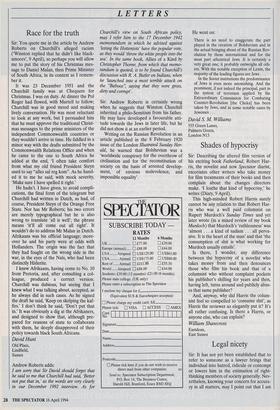LETTERS Race for the truth
Sir: You quote me in the article by Andrew Roberts on Churchill's alleged racism (Winston replied that he didn't like black- amoors', 9 April), so perhaps you will allow me to put the story of his Christmas mes- sage to Daniel Malan, then Prime Minister of South Africa, in its context as I remem- ber it.
It was 23 December 1951 and the Churchill family was at Chequers for Christmas. I was on duty. At dinner the Pot Roger had flowed, with Martell to follow; Churchill was in good mood and making lively conversation. He was most reluctant to look at any work, but I persuaded him that he must approve the traditional Christ- mas messages to the prime ministers of the independent Commonwealth countries or they wouldn't arrive in time. He fiddled in a minor way with the drafts submitted by the Commonwealth Relations Office and when he came to the one to South Africa he added at the end, 'I often take comfort from what my old friend President Steyn used to say "alles sal reg kom". As he hand- ed it to me he said, with mock severity, `Make sure I have spelled it right.'
He hadn't. I have given, to avoid compli- cations, the final form of the telegram but Churchill had written in Dutch, as had, of course, President Steyn of the Orange Free State. Nor has Mr Roberts; his two errors are merely typographical but he is also wrong to translate 'all is well'; the phrase means 'it'll all come out all right'. It wouldn't do to address Mr Malan in Dutch. Afrikaans was his official language; more- over he and his party were at odds with Hollanders. The origin was the fact that they had fought on the wrong side in the war, in the eyes of the Nats, who had been distinctly Hitlerite.
I knew Afrikaans, having come to No. 10 from Pretoria, and, after consulting a col- league, produced a correct version. Churchill was dubious, but seeing that I knew what I was talking about, accepted, as he always did in such cases. As he signed the draft he said, 'Keep on skelping the kaf- firs.' I don't think he said, 'Don't put that in.' It was obviously a dig at the Afrikaners, and designed to show that, although pre- pared for reasons of state to collaborate with them, he deeply disapproved of their policy towards black South Africans.
David Hunt
Old Place, Lindfield, Sussex
Andrew Roberts adds: I am sorry that Sir David should forget that he said to me that Churchill had said, 'Better not put that in,' as the words are very clearly in our December 1992 interview. As for Churchill's view on South African policy, may I refer him to the 17 December 1942 memorandum in which he advised against 'letting the Hottentots' have the popular vote, as they would 'throw the white people into the sea'. In the same book Allies of a Kind by Christopher Thorne, from which that memo- randum is quoted, is to be found Churchill's discussion with R. A. Butler on Indians, when he 'launched into a most terrible attack on the "Baboos", saying that they were gross, dirty and corrupt'.


























































 Previous page
Previous page